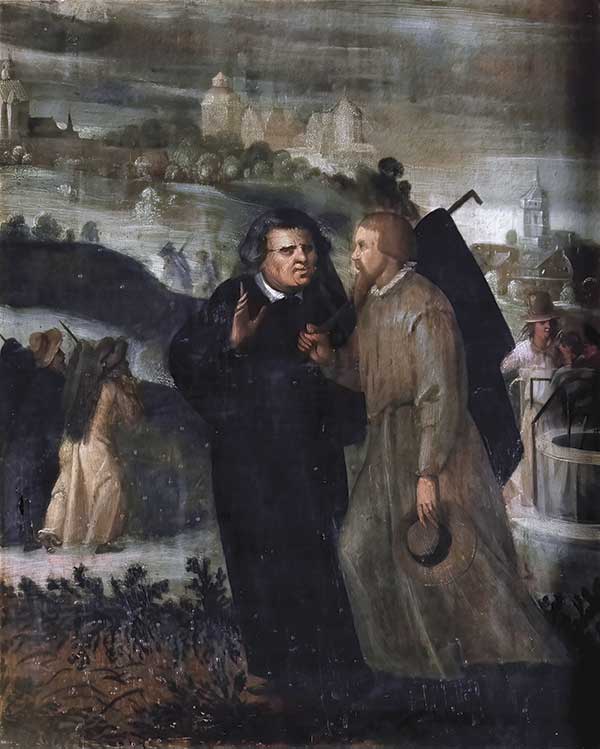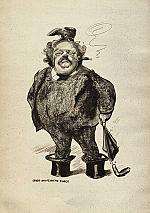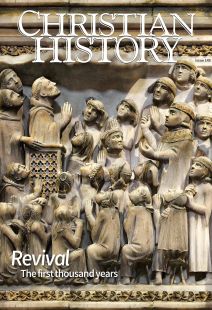What does it mean to live in Christ?

[Anonymous, Luther and a Pilgrim on the Altar in St. Mary’s Church in Eilenburg, c. 1615—Public domain, Wikimedia ]
A Christian is a perfectly free lord of all, subject to none.
A Christian is a perfectly dutiful servant of all, subject to all.
These two theses seem to contradict each other. If, however, they should be found to fit together, they would serve our purpose beautifully. Both are Paul’s own statements, who says in 1 Corinthians 9, “For though I am free from all men, I have made myself a slave to all,” and in Romans 13, “Owe no one anything, except to love one another.” Love by its very nature is ready to serve and be subject to him who is loved. So Christ, although he was Lord of all, was “born of woman, born under the law,” and therefore, was at the same time a free man and a servant, “in the form of God” and “of a servant.” . . .
One thing, and only one thing, is necessary for Christian life, righteousness, and freedom. That one thing is the most holy Word of God, the gospel of Christ. . . . To preach Christ means to feed the soul, make it righteous, set it free, and save it, provided it believes the preaching. . . . Therefore it is clear that, as the soul needs only the Word of God for its life and righteousness, so it is justified by faith alone and not any works; for if it could be justified by anything else, it would not need the Word, and consequently it would not need faith. . . . Wherefore it ought to be the first concern of every Christian to lay aside all confidence in works and increasingly to strengthen faith alone and through faith to grow in the knowledge, not of works, but of Christ Jesus.—The Freedom of a Christian (1520), translation originally published in CH #34
Faith is a living, unshakeable confidence in God’s grace; it is so certain, that someone would die a thousand times for it. This kind of trust in and knowledge of God’s grace makes a person joyful, confident, and happy with regard to God and all creatures. This is what the Holy Spirit does by faith. Through faith, a person will do good to everyone without coercion, willingly and happily; he will serve everyone, suffer everything for the love and praise of God, who has shown him such grace. It is as impossible to separate works from faith as burning and shining from fire.
Therefore be on guard against your own false ideas and against the chatterers who think they are clever enough to make judgments about faith and good works but who are in reality the biggest fools. Ask God to work faith in you; otherwise you will remain eternally without faith, no matter what you try to do or fabricate.—Preface to Romans (1522), translation from CHI study module on the Reformation. Luther’s Preface later had a profound influence on John Wesley and the Methodist revival.
It is a good thing to let prayer be the first business of the morning and the last at night. Guard yourself carefully against those false, deluding ideas which tell you, “Wait a little while. I will pray in an hour; first I must attend to this or that.” Such thoughts get you away from prayer into other affairs which so hold your attention and involve you that nothing comes of prayer for that day.
It may well be that you may have some tasks which are as good or better than prayer, especially in an emergency. There is a saying ascribed to St. Jerome that everything a believer does is prayer, and a proverb, “He who works faithfully prays twice.” Yet we must be careful not to break the habit of true prayer and imagine other works to be necessary which, after all, are nothing of the kind.—A Simple Way to Pray (1535), translation originally published in CH #34
By Martin Luther and translators
[Christian History originally published this article in Christian History Issue #149 in 2023]
Next articles
Questions for reflection: Renewal, revival, and reform
Use these questions on your own or in a group to reflect on medieval renewal movements.
the editorsRecommended resources: Medieval renewals
Read more about revival, renewal, and reform in the Middle Ages in these resources recommended by our authors and the CH team
the editors and authorsDid you know? Best of CH
Memorable “Did you know?” facts from 150 issues of CH
editors and contributorsSupport us
Christian History Institute (CHI) is a non-profit Pennsylvania corporation founded in 1982. Your donations support the continuation of this ministry
Donate







